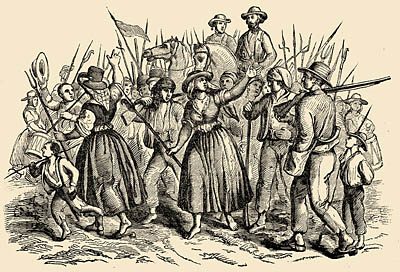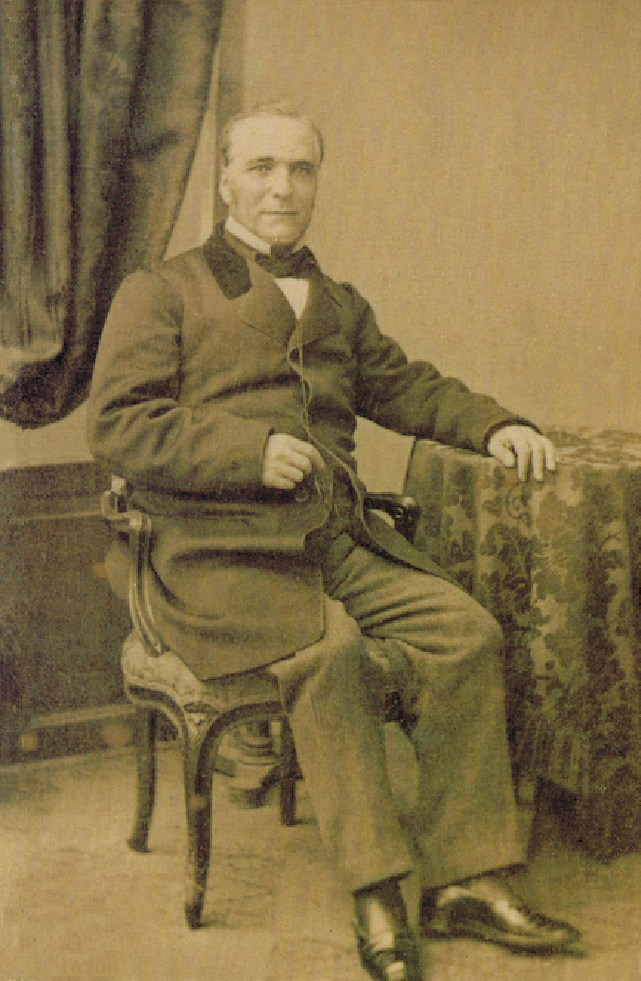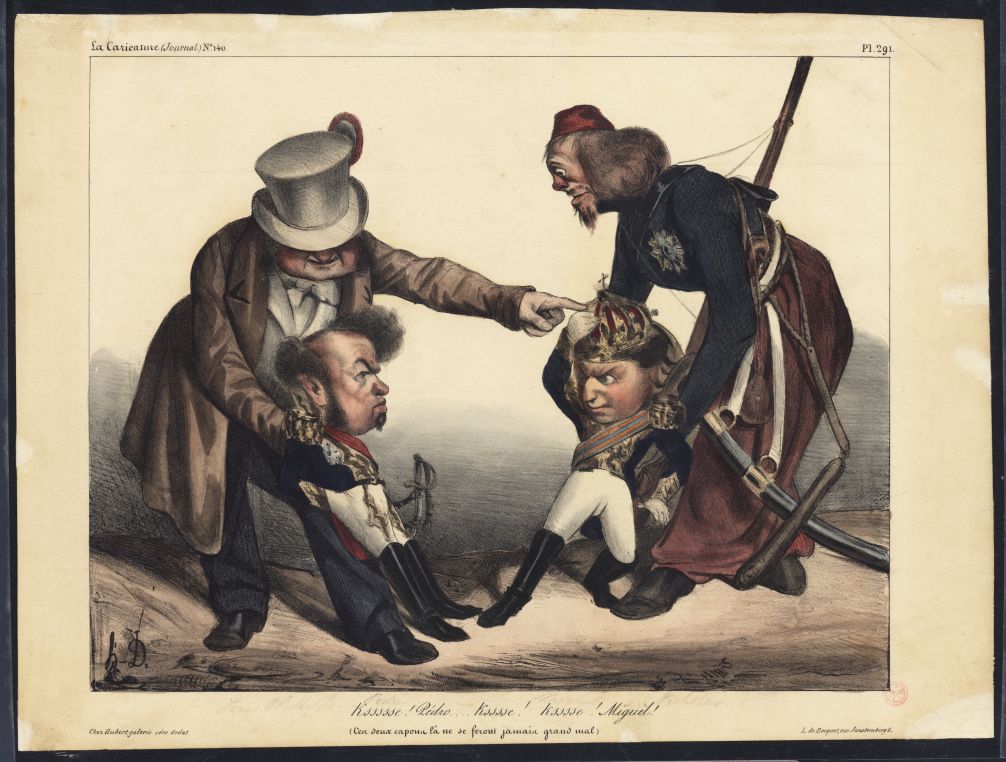|
Maria Da Fonte Revolution
The Revolution of Maria da Fonte, or Revolution of the Minho, is the name given to a popular revolt in the spring of 1846 against the Cartista government of Portugal (presided over by António Bernardo da Costa Cabral, 1st Marquess of Tomar). The revolt resulted from social tensions remaining from the Liberal Wars, exacerbated by great popular discontent generated by new military recruitment laws, fiscal alterations and the prohibition on burials inside churches. It began in the area of Póvoa de Lanhoso (Minho Province, Minho) by a popular uprising that little by little extended to the whole north of Portugal. The instigator of the initial riots was a woman called Maria, native of the freguesia of Fontarcada, who would become known by the nickname of Maria da Fonte. As the initial phase of the insurrection had a strong female element, she ended up giving her name to the revolt. The uprising afterwards spread to the remainder of the country and provoked the replacement of the ... [...More Info...] [...Related Items...] OR: [Wikipedia] [Google] [Baidu] |
Patuleia
 The Patuleia, Guerra da Patuleia, or Little Civil War was a civil war in Portugal in 1846-47, so called to distinguish it from the 'great' civil war between Pedro IV of Portugal, Pedro IV and Miguel I (1828-1834). The Patuleia occurred after the Revolution of Maria da Fonte, and was closely associated with her. It was caused by the nomination, as a result of the palace coup of 6 October 1846, known as the "Emboscada (historical event), Emboscada", to set up a clearly Cartista government presided over by marshal João Francisco de Saldanha Oliveira e Daun, 1st Duke of Saldanha, João Oliveira e Daun, Duke of Saldanha.
The war lasted eight months, pitting the Cartistas (with the support of Queen Maria II of Portugal, Maria II) against an unnatural coalition of Septembrism, Septembrists and Miguelists. The f ...
The Patuleia, Guerra da Patuleia, or Little Civil War was a civil war in Portugal in 1846-47, so called to distinguish it from the 'great' civil war between Pedro IV of Portugal, Pedro IV and Miguel I (1828-1834). The Patuleia occurred after the Revolution of Maria da Fonte, and was closely associated with her. It was caused by the nomination, as a result of the palace coup of 6 October 1846, known as the "Emboscada (historical event), Emboscada", to set up a clearly Cartista government presided over by marshal João Francisco de Saldanha Oliveira e Daun, 1st Duke of Saldanha, João Oliveira e Daun, Duke of Saldanha.
The war lasted eight months, pitting the Cartistas (with the support of Queen Maria II of Portugal, Maria II) against an unnatural coalition of Septembrism, Septembrists and Miguelists. The f ...
[...More Info...] [...Related Items...] OR: [Wikipedia] [Google] [Baidu] |
Cabralism
Cabralism is the period from 1842 to 1846 when António Bernardo da Costa Cabral dominated Portuguese politics. Cabralism was characterized by the adoption of the constitutional doctrine contained in the restored Constitutional Charter of 1826, which was taken as a dogma to be scrupulously respected, thus creating a stable framework that was exploited by the government. The government was characterized by being a strong executive, decisively supported by the royal powers enshrined in the Charter, especially the reserve power vested in the sovereign. History With the express support of Queen Maria II, of whom Costa Cabral was considered a valedictorian, the government's parliamentary front was secured by an obedient majority, congregated in an exclusivist party and committed to maintaining, against the onslaughts of the left and the remnants of Miguelism, the order deemed necessary for the country's development. One of the first reforms of Cabralism was administrative centr ... [...More Info...] [...Related Items...] OR: [Wikipedia] [Google] [Baidu] |
19th-century Revolutions
The 19th century began on 1 January 1801 (represented by the Roman numerals MDCCCI), and ended on 31 December 1900 (MCM). It was the 9th century of the 2nd millennium. It was characterized by vast social upheaval. Slavery was abolished in much of Europe and the Americas. The First Industrial Revolution, though it began in the late 18th century, expanded beyond its British homeland for the first time during the 19th century, particularly remaking the economies and societies of the Low Countries, France, the Rhineland, Northern Italy, and the Northeastern United States. A few decades later, the Second Industrial Revolution led to ever more massive urbanization and much higher levels of productivity, profit, and prosperity, a pattern that continued into the 20th century. The Catholic Church, in response to the growing influence and power of modernism, secularism and materialism, formed the First Vatican Council in the late 19th century to deal with such problems and confirm cer ... [...More Info...] [...Related Items...] OR: [Wikipedia] [Google] [Baidu] |
1846 In Portugal ...
Events in the year 1846 in Portugal. Incumbents *Monarch: Mary II *Prime Ministers: António Bernardo da Costa Cabral, 1st Marquis of Tomar; Pedro de Sousa Holstein, 1st Duke of Palmela; João Carlos Saldanha de Oliveira Daun, 1st Duke of Saldanha Events *6 October – Emboscada (palace coup) *19 November – Banco de Portugal established Arts and entertainment Sports Births *21 March – Rafael Bordalo Pinheiro, artist, comics creator (d. 1905). *5 November – Joaquim Pimenta de Castro, military officer, mathematician and politician (died 1918) Deaths References {{Year in Europe, 1846 1840s in Portugal Years of the 19th century in Portugal Portugal Portugal, officially the Portuguese Republic, is a country on the Iberian Peninsula in Southwestern Europe. Featuring Cabo da Roca, the westernmost point in continental Europe, Portugal borders Spain to its north and east, with which it share ... [...More Info...] [...Related Items...] OR: [Wikipedia] [Google] [Baidu] |
19th Century In Portugal
19 (nineteen) is the natural number following 18 and preceding 20. It is a prime number. Mathematics Nineteen is the eighth prime number. Number theory 19 forms a twin prime with 17, a cousin prime with 23, and a sexy prime with 13. 19 is the fifth central trinomial coefficient, and the maximum number of fourth powers needed to sum up to any natural number (see, Waring's problem). It is the number of compositions of 8 into distinct parts. 19 is the eighth strictly non-palindromic number in any base, following 11 and preceding 47. 19 is also the second octahedral number, after 6, and the sixth Heegner number. In the Engel expansion of pi, 19 is the seventh term following and preceding . The sum of the first terms preceding 17 is in equivalence with 19, where its prime index (8) are the two previous members in the sequence. Prime properties 19 is the seventh Mersenne prime exponent. It is the second Keith number, and more specifically the first Keith p ... [...More Info...] [...Related Items...] OR: [Wikipedia] [Google] [Baidu] |
Casimiro José Vieira
Casimiro or Casemiro may refer to: Given name * Casemiro do Amaral (1892–1939), Brazilian footballer * Casemiro Mior (born 1958), Brazilian football manager and former footballer * Casimiro de Abreu (1839–1860), Brazilian poet, novelist and playwright * Casimiro Alegre (1741–1825), Argentine militia officer and landowner * Casimiro Asumu Nze (born 1975), Equatoguinean sprinter * Casimiro Berenguer (1909–2000), Puerto Rican nationalist * Casimiro Castro (1826–1889), Mexican painter and lithographer * Casimiro Díaz (1693–1746), Spanish Augustinian friar * Casimiro Gennari (1839–1914), Italian Catholic cardinal * Casimiro Gómez Ortega (1741–1818), Spanish physician and botanist * Casimiro Monteiro (1920–1993), Portuguese Goan assassin * Casimiro Montenegro Filho (1904–2000), Brazilian army and air force officer * Casimiro Olañeta (1795–1860), Bolivian politician * Casimiro de Oliveira (1907–1970), Portuguese racing driver * Casimiro Radice (1834� ... [...More Info...] [...Related Items...] OR: [Wikipedia] [Google] [Baidu] |
João Augusto Marques Gomes
João is a given name of Portuguese origin. It is equivalent to the given name John. The diminutive is Joãozinho and the feminine is Joana. It is widespread in Portuguese-speaking countries. Notable people with the name are enumerated in the sections below. Kings * João I of Portugal * João II of Portugal * João III of Portugal * João IV of Portugal * João V of Portugal * João VI of Portugal * João I of Kongo, ruled 1470–1509 * João II of Lemba or João Manuel II of Kongo, ruled 1680–1716 * Dharmapala of Kotte, last King of the Kingdom of Kotte, reigned 1551–1597 Princes * João Manuel, Prince of Portugal (1537–1554), son of John III * Infante João, Duke of Beja (1842–1861) Arts and literature * João Borsch, Portuguese musician * João Bosco, Brazilian musician * João Cabral de Melo Neto, Brazilian poet and diplomat * João César Monteiro, Portuguese film director * Joao Constancia, Filipino singer, actor and dancer * João Donato, Brazilian music ... [...More Info...] [...Related Items...] OR: [Wikipedia] [Google] [Baidu] |
Camilo Castelo Branco
Camilo Castelo Branco, 1st Viscount of Correia Botelho (; 16 March 1825 – 1 June 1890), was a prolific Portuguese writer of the 19th century, having produced over 260 books (mainly novels, plays and essays). His writing is considered original in that it combines the dramatic and sentimental spirit of Romanticism with a highly personal combination of sarcasm, bitterness and dark humour. He is also celebrated for his peculiar wit and anecdotal character, as well as for his turbulent (and ultimately tragic) life. His writing, which is centred in the local and the picturesque and is in a general sense affiliated with the Romantic tradition, is often regarded in contrast to that of Eça de Queiroz – a cosmopolitan dandy and a fervorous proponent of Realism, who was Camilo's literary contemporary in spite of being 20 years younger. This ''tension'' between Camilo and Eça – often dubbed by critics ''the literary guerrilla'' – has been interpreted as a synthesis of the two ... [...More Info...] [...Related Items...] OR: [Wikipedia] [Google] [Baidu] |
1834 Quadruple Alliance
The Quadruple Alliance was a treaty signed between the United Kingdom of Great Britain and Ireland, Kingdom of France, Spain and Kingdom of Portugal on 22 April 1834, by which the four States undertook to expel from Portugal the Portuguese Infante Miguel and the Spanish Infante Carlos. With the beginning of the Carlist War, additional articles were signed in August of that year, by which the rest of the signatory parties undertook to help the legitimist government in Spain. The treaty was understood by the Austrian Empire, Russian Empire and Kingdom of Prussia, absolutist powers, as a joint diplomatic action in international politics to defend the liberal models represented by the governments of the Quadruple Alliance. In the practical field, given that France and the United Kingdom were the first European powers, it was a question of both securing partial control of Spain and Portugal as medium-sized countries with unstable policies, such as the government of Isabella II in S ... [...More Info...] [...Related Items...] OR: [Wikipedia] [Google] [Baidu] |
Convention Of Gramido
The Convention of Gramido was an agreement signed on 29 June 1847, in the Casa Branca (White House) of Gramido, in Valbom, Portugal. It marked the conclusion of the Patuleia, a civil war between the Septembrism, Septembrists and the Cartista, Cartistas. The Convention was signed by the commanders of the Spanish Empire, Spanish and British Empire, British forces acting under the 1834 Quadruple Alliance, Quadruple Alliance, the representative of the Portuguese government in Lisbon, and representatives from the Junta in Porto. The agreement ended the conflict on terms that, while conciliatory in tone, solidified the Cartistas' victory and strengthened the position of Maria II of Portugal, Queen Maria II's government. The agreement The Convention was signed by representatives from the warring parties and allied powers. Lieutenant General Manuel de la Concha and Colonel Buenaga represented Spain, while Colonel Wilde acted on behalf of the United Kingdom. The Portuguese government was re ... [...More Info...] [...Related Items...] OR: [Wikipedia] [Google] [Baidu] |
João Francisco De Saldanha Oliveira E Daun, 1st Duke Of Saldanha
João is a given name of Portuguese origin. It is equivalent to the given name John. The diminutive is Joãozinho and the feminine is Joana. It is widespread in Portuguese-speaking countries. Notable people with the name are enumerated in the sections below. Kings * João I of Portugal * João II of Portugal * João III of Portugal * João IV of Portugal * João V of Portugal * João VI of Portugal * João I of Kongo, ruled 1470–1509 * João II of Lemba or João Manuel II of Kongo, ruled 1680–1716 * Dharmapala of Kotte, last King of the Kingdom of Kotte, reigned 1551–1597 Princes * João Manuel, Prince of Portugal (1537–1554), son of John III * Infante João, Duke of Beja (1842–1861) Arts and literature * João Borsch, Portuguese musician * João Bosco, Brazilian musician * João Cabral de Melo Neto, Brazilian poet and diplomat * João César Monteiro, Portuguese film director * Joao Constancia, Filipino singer, actor and dancer * João Donato, Brazilian m ... [...More Info...] [...Related Items...] OR: [Wikipedia] [Google] [Baidu] |



